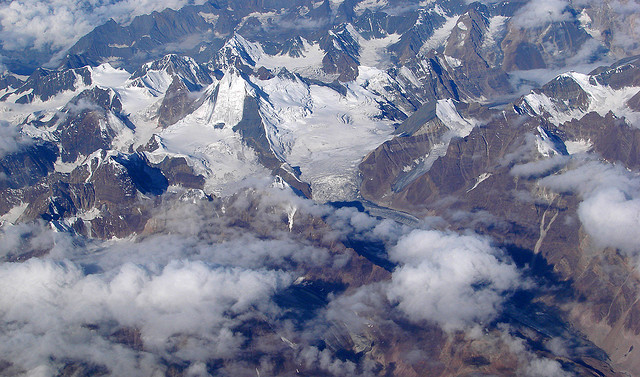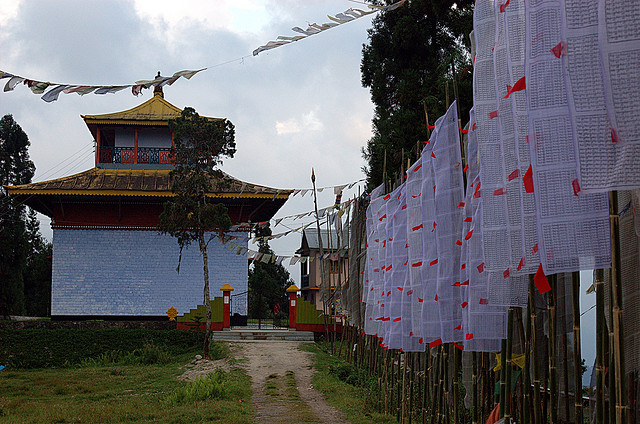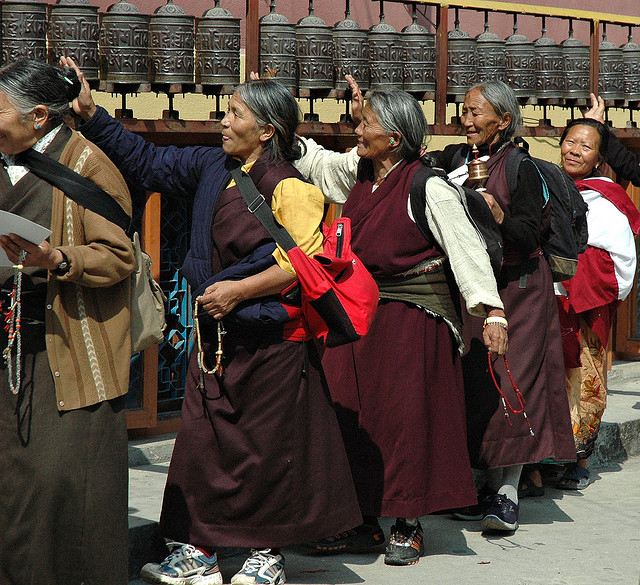I can’t be sure, but I think that the row in the lobby of the Kennilworth Hotel might have been significant. Tucked away in a leafy Kolkata suburb, all hidden lighting and muted colours, it wasn’t the sort of place you’d expect to see half a dozen uniformed military types giving one of their number a sharp and aggressive dressing down. Yet there they were, in the gleaming marble lobby, snarling and snapping, taut and tense. And the soldier in the middle, cowed and silent, seeming to have little to say, and no other choice than to stand and take the flak. The hotel’s deputy manager, in her smart, sober sari said, when I asked, “It is nothing for you to worry about. Please, do not worry.” But she looked miserable and wrung her hands, making the slim golden bangles dance and clink on her arm.
The police roadblock was definitely significant. Sat in the back of the shared jeep I’d picked up at Siliguri station that morning, I shifted uncomfortably as several pairs of official eyes gave the vehicle much more than the cursory glance I’d been expecting. They peered into each of the windows, seeming to scrutinise every nook and cranny, and prompted the driver to muse, as we were eventually waved off, that it had almost been as though they expected to find a body in the back of the car. But this was the Himalayas, not Midsummer Murders, so I laughed it off, and we continued our journey to Darjeeling.


If this story is about anything, it’s about what happens when you fail to prepare; it’s about the things that can happen when you ignore the advice and tune out the chatter that might have made you behave differently if you hadn’t been quite so complacent. The world isn’t a theme park; just because you’ve paid your money, it won’t stop and let you get off. It was my third visit to the Himalayas. Brought back by vertiginous vistas, fantastic people, and an overwhelming sense of peacefulness, I couldn’t conceive of this trip being any more or less fractious than the last. Sure, I’d read the warnings in my updated guidebook, bought specially for the occasion, but thought myself savvy enough not to get caught up in anything, so hadn’t bothered with news websites or travel message boards.
I arrived in Darjeeling about lunchtime and checked into the Hotel Dekeling, at the top of several flights of steep stone steps. Run by a Tibetan matriarch, who seemed to spend all day ferrying piles of laundry to and from the hotel’s washing machine, it’s a nice little place, clean and bright, and my bedroom had views over the market.
For lunch, I made my way to the cafe overlooking Darjeeling’s pedestrianized Mall. Sitting at a small table outside, on the terrace, I watched the out-of-season tourists milling in and out of the souvenir shops, and a trio of elderly men, leading donkey rides up and down one of the paths that feeds off from the Mall. I’d only just placed my order with one of the cafe’s waiters when he ran back out, in a flap, “You must go inside,” he ordered. “The terrace is closed.” and he bundled me into the cafe. Once inside, he ushered me quickly to a table, then joined his colleagues, who were frantically dragging chairs and tables from the terrace, back into the cafe, making sure that everything was pulled back well away from the windows. This done, they began unrolling steel shutters from the front of the building, working quickly and with a sense of quiet panic.
To someone like me, who grew up in the UK throughout the 1970s and 80s, steel shutters are a staple of television news, redolent of terrorism, football hooligans, and Saturday afternoon shopping spree bombs, not leisurely holidays spent watching mountain life spool by. The cafe staff began lighting feeble wall lamps to counteract the lack of light, and the old Withnail & I quote, something like, “We’ve come on holiday by accident, please can you help us?” sprung from my inner lever-arch file of pithy sayings.
The staff suddenly seemed to remember that they had customers. “It’s nothing to worry about,” said one, smiling nervously. “Just a little local difficulty. You will be perfectly safe. ”
“It’s always the same.” A man’s voice came from one of the room’s murkier corners. Sat at a table, he was hunched miserably over a coffee cup, “they’re just shooting themselves in the foot.” He took a sip from his cup, and, with his voice raised, shouted bitterly, “Why don’t they just stop?”
“It’s just politics,” said another of the waiters, patiently.
After half an hour, the waiters decided that it was safe to take down the shutters. Cloistered away in the small, dark room, it hadn’t been clear what, if anything, had been going on outside – if I’d been expecting the sounds of gunshots, rioting, whatever, I’d been disappointed. Leaving the cafe to walk back to my hotel, too, everything seemed normal at first. It soon became apparent, though, that despite the early hour, all around me, business and shops were shutting, quickly, abruptly, and with little explanation. It felt like the Wild West had come east; High Noon at Darjeeling.


Back at the hotel, through a combination of information supplied by the Tibetan matriarch and stuff gleaned from the internet, I was able to piece together a little of what was going on. With murdered politicians, escaped prisoners, missing men, and wildcat strikes all in the mix, it seemed like a rather extreme version of the Famous Five Go To Kirrin Island, with a few pages from the TUC manifesto thrown in for good measure. The Hills were on lockdown; roads were closed, everything was shut, and nobody knew for how long.
Throughout town, provisions ran out pretty quickly. Coming from a society where pretty much anything can be had at any day of the hour or night, this came as a bit of a shock to the system. What do you do when there’s no Tescos, no corner shop, no bus to nip you into town for whatever it is you need? What you do is watch rain streaming down windows; you stand in huddles with other tourists, swapping evacuation rumours. These were rife and stood as counterbalance to the official PR, which was busy spinning stories for the world outside about the successful and all encompassing evacuation carried out by local officials, bigwigs, and dignitaries. “There are no tourists left in the Hills” they proclaimed from website and newspaper front pages. Meanwhile, we tourists left in the Hills continued to watch the rain, huddle, and plot.
A routine developed, although it was never quite clear how much it owed to rumour, and how much to official organisation. Every morning, at about 8am, everyone who wanted to leave town –rain poncho’d tourists and locals running low on food – would slosh their way down streets so wet and narrow they were almost streams to the transport police office, at the bottom of town. Once there, we would wait with almost religious devotion the arrival of the one item of transport allowed out of town. Sometimes something would turn up, causing a scrum amongst the waiting hordes. Other times, it didn’t, remaining stuck solidly in fable. If it got to midday, and nothing had turned up, it meant trudging back up hill to your hotel, and waiting to start the whole thing all over again the next day.
My early experiences at the scrums were unsuccessful, leaving me at the wrong end of someone else’s elbow. On my final day, however, I stood back a little from the crowd when a large army lorry pulled up a little way along from the police office. Being stood back a little meant I was that much nearer to the vehicle, so I had a head start in the scrum. I remember arms pulling me and my luggage up into the back of the lorry; I remember the pitch black while my eyes adjusted to the gloom; I remember realising that I had just jumped into the back of an army lorry in the middle of a “little local difficulty”, without any real idea of where it was going.
I shared the journey down the hill with a handful of westerners and a couple of locals, including a young soldier, whose gun, slung carelessly over his knees, banged into my thighs whenever we went over a rut in the road, putting my memories of London commuter tussles over infringement of personal space into perspective.


And that was it. I found out that everything had gone back to normal, as suddenly as it has closed down, three or four days later, with little explanation. It seems as though the murdered politician, the escaped prisoner, the missing man were all brushed swiftly under the bureaucratic carpet. Given the importance of tourism to the local economy, I can see why; while kicking my heels in town, I had plenty of conversations with locals whose livelihoods were being threatened by the disruption caused by seemingly never ending wildcat strikes being called at a moment’s notice.
It’s likely that sympathy for the privileged westerner whose holiday went for a Burton is going to be thin on the ground, and that’s as it should be. I’ll admit that, between the rain, the limited rations, and the early morning trudges through town to wait for a bus that didn’t always turn up, I did occasionally feel a little sorry for myself. I didn’t need to be stuck up a mountain on lockdown to know that most of the world has it harder than I do, and I don’t think my experience qualifies me for a medal of any sort. I do feel, though, that I caught a teeny tiny glimpse of life in another environment, one perhaps more vulnerable than my own; a brief snapshot of the world with her makeup off, high heels kicked off and into the corner of the room. And for that, I’m very grateful.
Photo credits: wildxplorer, appaji, Wonderlane